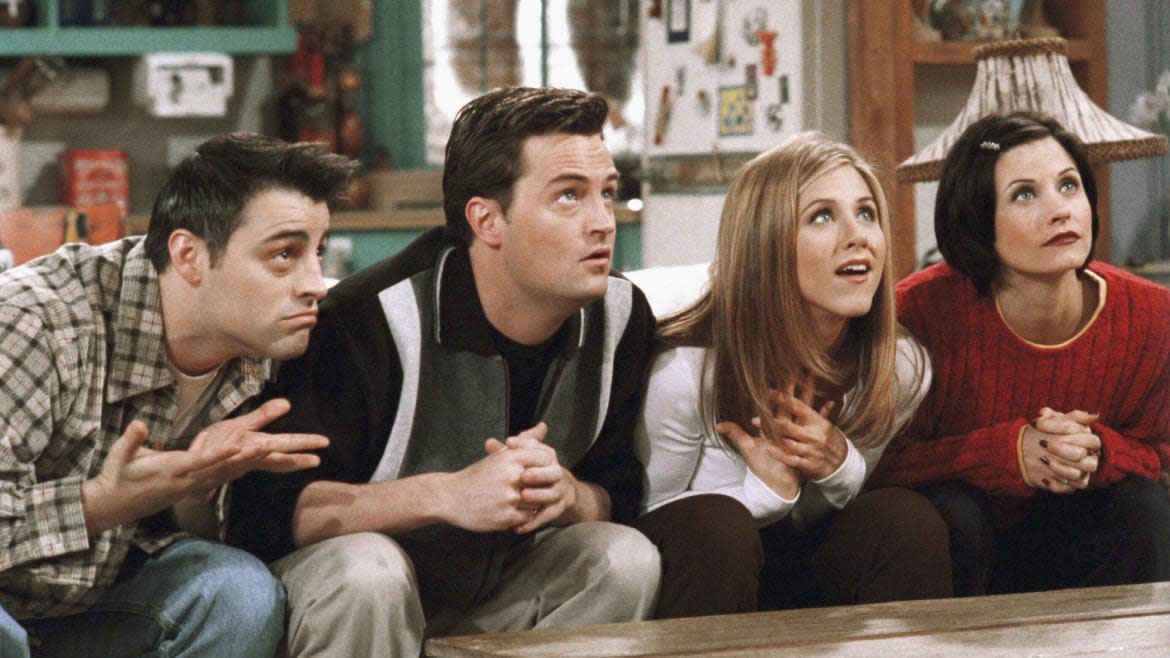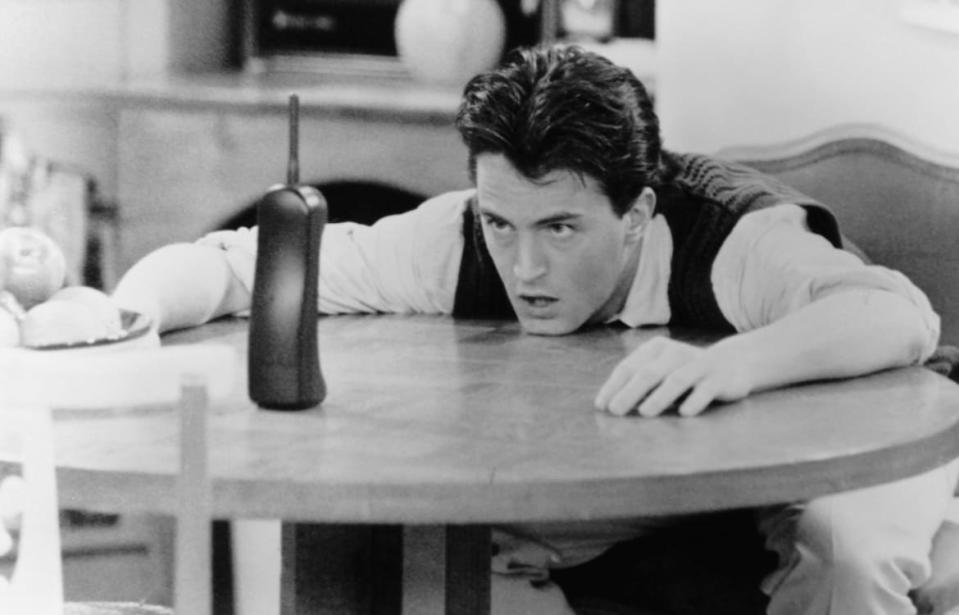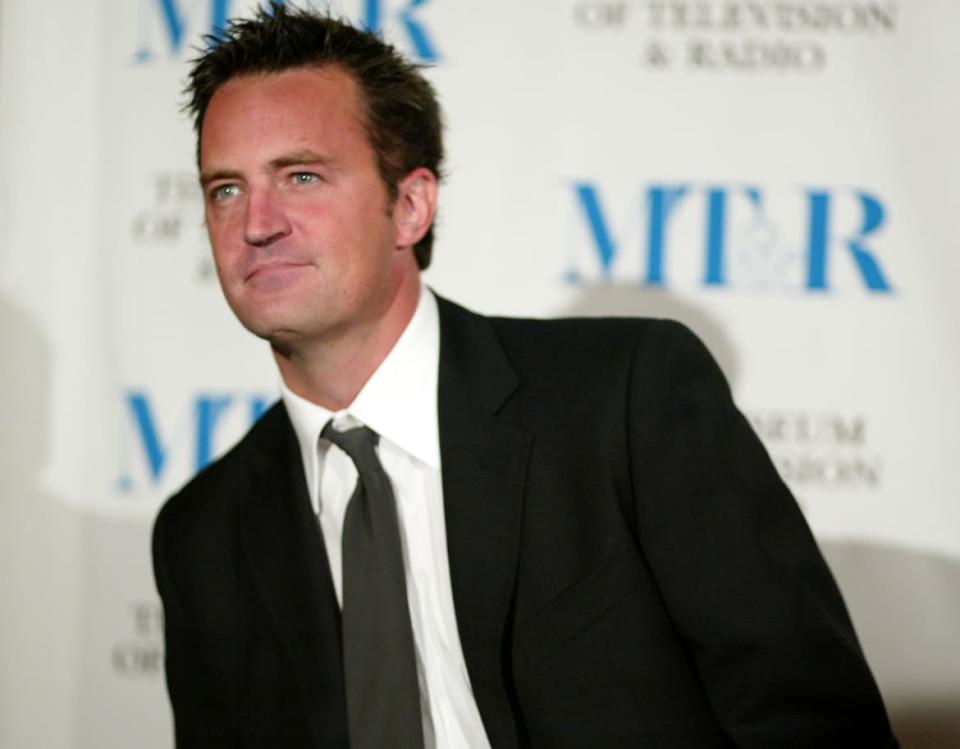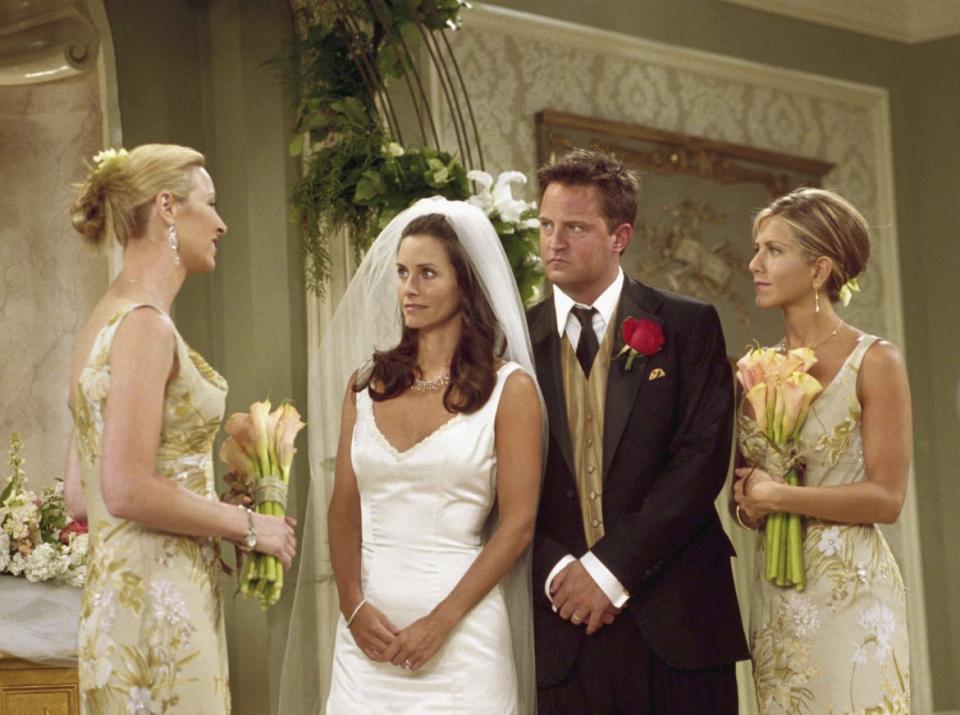Matthew Perry Gave a Masterclass in Sarcasm and the Sweetness of Humanity

- Oops!Something went wrong.Please try again later.
One of the greatest lies polite society ever told was that sarcasm is a bad thing. That people who rely on it use it as a crutch, a shield, or a mask—a way of presenting themselves to the world without having to be authentic, vulnerable, or, scariest of all, earnest. The sins of sarcasm have come down from some moral mount, and passed on through generations: It is mean; it is disrespectful; it is lazy; it is poor manners; it is condescending… At some point, the thesaurus runs out of synonyms, but you get the gist.
What the finger-waggers and buzzkills skip over, as if they’re guarding a secret they don’t want to get out, is that sarcasm is also extremely funny. And, when done right, it exposes what is maybe one of the most complicated and brutally honest parts of the human condition. Matthew Perry didn’t just do sarcasm right. His nearly four-decade acting career leaves behind a masterclass in the magic of it: its value, its relatability, and its power to do what is paradoxically the most difficult and simplest thing in the world, which is making us laugh.
If you’re anything like me, your Saturday night was interrupted by a flurry of texts, alerts, and social media posts reacting in shock to the news that Perry had died at age 54 at his home in Los Angeles. When someone this unfathomably famous dies so suddenly, it’s as trippy as it is heartbreaking. Perry is so young now, to die in his fifties. But he is so young forever, frozen in time in his vibrant twenties and thirties in what ranks as one of the most popular entertainment properties in history, Friends.
He was the snarky, jokey, and, yes, sarcastic Chandler Bing—known to the most devoted fans as Miss Chanandler Bong. That made Perry one of the most consequential pop-culture figures when Friends began airing in 1994 through its finale in 2004, and still as the series played incessantly (to channel-flippers’ delight) in reruns for the next decade-plus. It happened again when the series reclaimed the title as the most popular show on TV when streamers launched bidding wars to make it a crucial part of their libraries.

Of course, you can’t reclaim a title you never lost. The show and its characters have been practically sewn into our souls, personalities, and senses of humor over the last 30 years. Friends and its ubiquity is timeless. So how can one of its actors’ time be cut short? How can Matthew Perry be dead?
What would really be useful right now is a good sarcastic joke. Something to pierce through the fog of confusion people are grappling with and pop the balloon that brings us all back down to reality. That’s what Perry did so well on Friends: crack a one-liner that, when the lunacy, hijinks, and ridiculousness of a situation approached its most combustible, was the secret ingredient that detonated the laughs and grounded us all again.
Every group needs a realist, and that’s what Chandler was on Friends. It’s easy to roll your eyes at the grouch when he’s being smug or wry. But without someone who boasts a decent sense of normalcy and who is finely in tune with his tolerance for being exasperated, the clowns would run amok. The clowns on Friends were hilarious, but they would be a little much if they didn’t have a Chandler to tell them, well, you’re being a little much.
‘Friends’ Star Matthew Perry Dead After Suspected Drowning
Perry did seem acutely aware of the idea that, especially in sitcoms, a sarcastic line delivery can be a lazy band-aid over uninspired writing or apathetic acting. He had a sense of the totality of what a character like Chandler could be, and the emotional shades behind a person who is assigned the shorthand of the “funny guy.”
Even when sitting in a corner of Monica and Rachel’s living room, shooting off smarmy jokes like poison darts, you sensed a bit of melancholy, and certainly of yearning. He wanted to belong, hence his constant presence in the group.
As the series went on and Chandler and Monica fell in love, he became a romantic, and he opened up emotionally. The most heartwarming moments—at least for me—weren’t the ones where he let down his walls and expressed how he was feeling. They were when he would punctuate those moments with a bad joke. It’s not that he was incapable of letting a moment breathe; it’s that he needed that layer of protection to feel safe, as if to live in those beautiful milestones totally as himself, his cynicism had to be present, too. They were grace notes to wonderfulness, a punchline “pinch me” to make sure it was real.

When I hear sarcasm, I feel seen. It’s a cry for attention, a way to announce yourself to a room and at least feign confidence, even when you don’t feel it. But, in my mind, it’s also announcing that very thing: Hey, I’m putting myself out here, I’m feeling really naked right now, and I could use a little validation. I don’t think sarcasm is pretentious; I think it’s incredibly human and sympathetic. In all those moments that fans attribute to Chandler’s full character arc—wedding, babies, lifelong friends—I never thought of them as breakthroughs. They’re break-ins: Other people who underestimated or misunderstood a person finally see who he really is.
One of the great evolving narratives of Friends is an overdue appreciation for how talented and nuanced the entire cast’s performances were, and that was certainly true of Perry. It’s not easy to transform the sitcom jokester into the Trojan horse of an entire series, the surprise vessel for all the emotional growth that happens over a decade of our lives. It’s certainly devastating to know about the demons Perry was fighting when he bore the burden of the show’s fame. But it also crystallizes the poignancy of his character’s journey and the way Chandler interacted with the world—especially those he loved.
I loved seeing shades of those Friends gifts in other classic Perry roles, like The Whole Nine Yards, Fools Rush In, and Studio 60 on the Sunset Strip. A deep sigh, raised eyebrow, or quick deadpan managed to dance between the euphoria of being the smartest person in the room (or at least thinking you are) and the gloom of weathering life—the tango that being alive in this world is supposed to be.

He played with that nuance and the “type” he had been cast in after Friends with one of his best performances, in the underappreciated 2011 series Mr. Sunshine. He played a self-involved manager of a sports arena, whose 40th birthday and the quirky demands of his well-meaning colleagues triggered an (albeit slow) awakening. It wasn’t hard to project a sort of art-imitating-life significance to the series, which Perry also co-wrote and executive produced. Given the intimate decades we’ve shared together through a TV screen, it’s bizarre to admit that Perry and I aren’t really “friends.” But among the ocean of untapped potential for future work from Perry, there’s the curiosity of what might have been next had he continued to explore that personal trajectory through his work.
It’s funny to think about what became Perry’s most indelible line delivery from Friends, the oft-quoted opinion starter, “Could I BE…” People now co-opt that phrase to make their own points, replicating Perry’s cadence as they say it. When something is mimicked so much and with such fervor, you start to notice something. Really, it’s inimitable. Matthew Perry is inimitable.
Keep obsessing! Sign up for the Daily Beast’s Obsessed newsletter and follow us on Facebook, Twitter, Instagram and TikTok.
Get the Daily Beast's biggest scoops and scandals delivered right to your inbox. Sign up now.
Stay informed and gain unlimited access to the Daily Beast's unmatched reporting. Subscribe now.

